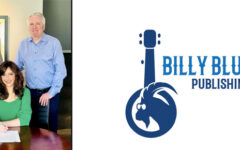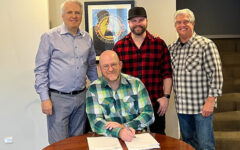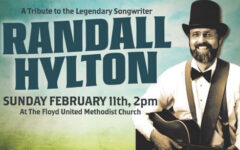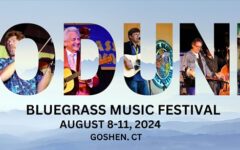This post is part of our occasional feature, Songwriter Profiles. If you have a suggestion for a bluegrass songwriter we might want to consider, please contact us.
 The Gibson Brothers – Eric on banjo, Leigh on guitar – began their musical journey at the age of 11 and 10 respectively. Eric began playing saxophone in the 5th grade, as did Leigh. A year later they started taking banjo and guitar lessons at Dick’s Country Store in Churubusco, New York.
The Gibson Brothers – Eric on banjo, Leigh on guitar – began their musical journey at the age of 11 and 10 respectively. Eric began playing saxophone in the 5th grade, as did Leigh. A year later they started taking banjo and guitar lessons at Dick’s Country Store in Churubusco, New York.
They were raised on a dairy farm – a farm that had been in their family since 1865 – in the most north-eastern section of New York, in the foothills of the Adirondacks in the Champlain Valley two miles from the Canadian border.
Their parents listened to bluegrass on the radio on Saturdays. They also liked Irish music and the brothers heard a lot of the Chieftains, Ryan’s Fancy, the Clancy Brothers, Tommy Makem, and the Irish Rovers. They listened to lots of different stuff and still do. This variety is something that shapes both their writing and performing.
Eric and Leigh listened to country radio a lot in the 1970s and early 1980s. Their favorites were Merle Haggard, Emmylou Harris, Don Williams, Tom T. Hall, Ricky Skaggs. Their cosmopolitan tastes meant that they heard Tom Petty, Credence Clearwater Revival, the Eagles, the Everly Brothers and Willie Nelson as well as folks like Gordon Lightfoot.
Eric Gibson was really ‚Äòturned on’ to bluegrass when their teacher, Eric O’Hara, gave him a tape of Flatt and Scruggs at Carnegie Hall.
Their education was further enhanced by listening to a tape of Ricky Skaggs’ Sweet Temptation, and then the brothers became familiar with some of the great duo singers of the past; firstly great favourites Buck Owens and Don Rich, and then the sibling harmonies of the Louvin Brothers, the Delmore Brothers, the Blue Sky Boys, the Everly Brothers and the Stanley Brothers. After the prompting of their minister, the Gibson brothers began singing themselves. With their singing of songs like Lonely Me, Lonely You, Satan’s Jewelled Crown and Gone Home, one of the many Gospel songs that they used to sing in church, the Gibson Brothers have joined that glorious pantheon.
In the early 1990s, they formed a bluegrass band with Junior Barber on resonator guitar, and Junior’s son, Mike, on bass. The quartet recorded three albums for Hay Holler Records and earned the recognition of their peers when they won the 1998 IBMA Emerging Artist of the Year award.
The brothers then had an abortive attempt at breaking into country music. With the aid of Ricky Skaggs they tried to get some major label interest in a traditional-sounding country record. However nothing materialized. "The timing wasn’t right,” they kept hearing.
So Eric and Leigh signed for Sugar Hill Records, who let the brothers make the records they wanted to make. They are very proud of their Sugar Hill years, recording four albums that all went to No.1 on the Bluegrass Unlimited chart.
 Now they are signed to Compass Records and have a new album, Ring The Bell, on release today (May 5). It features six originals (including a co-write with Bob DiPiero). Staying true to their upstate New York farm boy roots, the Gibson Brothers recorded two agricultural-themed songs for this record, one written by Leigh (Bottomland) and one by Eric (Farm Of Yesterday). The former, originally recorded for the unreleased country record, is given an old-timey treatment here and touches on the lives of sharecroppers. Farm of Yesterday was written as a tribute to their parents and the family farm.
Now they are signed to Compass Records and have a new album, Ring The Bell, on release today (May 5). It features six originals (including a co-write with Bob DiPiero). Staying true to their upstate New York farm boy roots, the Gibson Brothers recorded two agricultural-themed songs for this record, one written by Leigh (Bottomland) and one by Eric (Farm Of Yesterday). The former, originally recorded for the unreleased country record, is given an old-timey treatment here and touches on the lives of sharecroppers. Farm of Yesterday was written as a tribute to their parents and the family farm.
The interview that follows was conducted with Eric Gibson.
When did you first start writing songs and why?
I started writing just for the fun of it in my teens. I wrote about love before I knew a thing about it, a lot of horrible songs early on. I got them out of the way though.
Which other songwriters have influenced you and in what ways?
I love so many writers. I love the simplicity of Harlan Howard — so many perfect country songs. Merle Haggard might be my favorite. his songs just seem so honest — like they needed to be written. I hope can write songs i that vein. I don’t want to write just to fill up a record. I want to write songs that sound like they needed to be written.
Gordon Lightfoot. Who is better? Nobody that I can think of. Tom Petty is a GREAT writer. I love the imagery in his songs. If he’d written only Southern Accent, I’d still call him a great writer. Tom T. Hall. He’s so intelligent.
What was the first song that you wrote and what prompted you to write that particular song?
I wrote a terrible song called The Echo Of The Slamming Of The Door when I was fifteen trying to impress an 18 year-old girl. It didn’t work.
As far as I can tell, you have written most of your songs independently of your brother. Is that correct? Why did you work that way?
I’m stubborn and don’t like being told what to do. However, we’ve started to write together more. I had to admit to myself that most of Leigh’s suggestions are right on the money. It’s hard taking advice from a llittle brother, but he’s really, really good.
However, for your most previous album, Iron & Diamonds, you were writing together. Is this correct and what prompted this new way of writing?
I think we’ve grown up a lot and have sunk a lot of years into this together. We’re a good team and we SHOULD write together as much as possible. Really, I think a lot of our independent writing had to do with the fact that Leigh moved 3 hours south of me about 10 years ago. We’ve been trying to write together more on the road the last couple of years. Writing on the road is a bear. It’s hard to get in the right frame of mind. I love putting on a pot of coffee and sitting in my kitchen with my guitar, all by myself. I can’t do that on the road.
Did writing with a partner mean that you had to make changes to the way in which you wrote?
Yes, you have to learn to compromise. A lot of my songs are so personal that I hate giving up anything. However, I think I’ve learned that there’s a fine line between being independent and bull-headed. I’m not a know-it-all, because the moment I think I’m getting somewhere as a writer, I’ll hear a Lightfoot song or something by Rodney Crowell. Then I’ll think, ‘They’re songwriters. I’m a hack.’ But I keep writing. I think Leigh and I are getting pretty good at it and part of it is our willingness to listen to each other without taking a suggestion too personally. We’re in this business together.
Tell me about the songs that you have written for your first album for Compass Records.
Leigh wrote one of the best songs I’ve ever heard (I mean it completely, and not because he’s my brother) called Bottomland. We recorded it originally for the Skaggs record, and Ricky did such a masterful job producing it that we never wanted to touch it. I think we held it on a pedestal since 2000! Every time I’d suggest it, Leigh would back away from it. The original recording was big and lush with a lot of instrumentation that we wouldn’t use on a bluegrass recording.
I finally said, ‘Let’s go more old-timey with it. What would Tim O’ do?’ I think that’s a great question to ask if you’re a roots artist! I love how it turned out, this song about a sharecropper’s son. We weren’t sharecroppers, but this song has imagery that I surely recognize.
I wrote one called Farm Of Yesterday that may be hard to sing if I think about it too much. That farm had such an impact on who we are, whatever that is. I still wake up and think I’m there after all this time. Crazy, isn’t it?
We wrote a Everly-flavored thing called Forever Has no End. My wife told me we needed to write more love songs. I love the chorus.
We dusted off an old one of ours from the 90s called I Can’t Like Myself. We re-wrote it with Mike Barber and Joe Walsh on our way to Nashville. We hit a real good groove on it in the studio.
We wrote What Can I Do? with hit-maker Bob DiPiero a few years back. He’s so fun to write with. Leigh had the melody and we all put our heads together and came up with this. Clayton Campbell put twin fiddles on it. Is there a better sound than twin fiddles?
Leigh and I wrote a hard-driving song called That’s What I Get For Lovin’ You. My son Kelley said, ‘That sounds like a Del McCoury song.’ there’s nothing wrong with that.
Have you had any of your songs recorded by other bands? Who has recorded you songs and what are the titles of those songs?
We haven’t had any kind of major success in that vein. We’re starting to get quite a few local and regional acts cut our songs. I’m always thrilled when anyone picks one of our songs for a record.
The Crowe Brothers have one of your songs, Holdin’ On When You’ve Let Go ‚Ķ this was written by you and Miss Dixie Hall. How did that come about? What was it like to write with Miss Dixie?
That was a pleasant surprise. I love that cut. After I heard it, I thought, ‘Why didn’t we cut that one?’ I like the Crowe Brothers a lot. They sound old school, and if you know me, you know that’s a compliment.
I love Miss Dixie. I wrote a version of that song when I was in my teens and my sister used to sing it. We were staying with Tom T. and Miss Dixie when we were working on the country record. I showed her that song, and she thought it needed to be changed. I wasn’t completely in love with the song and felt it needed improvement. She asked if I’d let her take a stab at it. We went to the Opry as Ricky’s guest, and when we returned the song was waiting on the dining room table. While we were having fun backstage at the Opry, Miss Dixie was working! She made that song into something worthwhile. I love her.
Which of your songs have charted/won you an award?
She Paints A Picture, Picture In The Moonlight, That Bluegrass Music, The Open Road, Iron & Diamonds, Picker’s Blues. We’ve had several others chart, but they weren’t originals. We haven’t won any awards, but That Bluegrass Music was nominated in 2003 by IBMA for Song of the Year.
You’re not from the bluegrass heartland; how does your environment colour what you write about?
We try to write about things we know. We know the North Country quite well.
From all the songs that you have written which gives you most satisfaction and why?
Arleigh is probably my favorite. I think I wrote a song about my grandfather that wasn’t over-the-top sentimental but was accurate. I bet choked up sometimes still, even though he’s been gone since 1988.
How do you feel about being described as the "bluegrass Everly Brothers"?
Well, I’d be honored to be mentioned in the same sentence as those guys. I don’t think we sound that much like them, but I’ve heard that comparison more than any other brother comparison.







